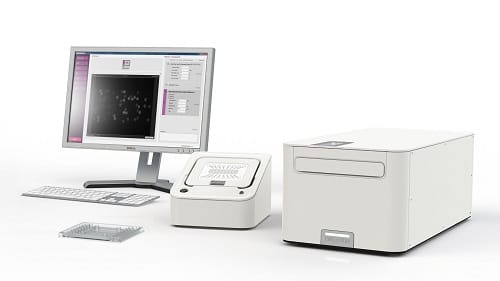MyCartis is an early-stage company that was founded in September 2014 when Pronota (Ghent, Belgium) and the Biocartis Evalution Business unit (Lausanne, Switzerland) joined forces. This was an ideal match, as Pronota was developing biomarker panels for a range of diseases and Biocartis was producing a multiplex platform to evaluate such biomarkers. MyCartis further develops this next-generation multiplex biomarker analysis platform as Evalution™, previously known as DMAT. It is designed for the detection of a broad range of biomolecules such as antibodies, antigens, nucleic acid probes, carbohydrates and metabolites, etc., and it has many clinical and pharmaceutical applications.
Next to making the technology available to the research and clinical community, this young company develops a portfolio of biomarker assays in-house or together with selected partners from industry or academia. It aims to provide the diagnostic market with tools to easily assess syndromic biomarker panels in diseases like heart failure, preeclampsia, renal dysfunction, allergy, autoimmune diseases, neurodegenerative diseases and oncology.
Barcoded particles reveal every secret of your sample
EvalutionTM is a multipurpose multiplex platform, allowing for the analysis of 1 to 16 samples at once. These samples can be all kinds of liquefied matrices such as blood, cerebrospinal fluid, stool and tissue. The platform makes use of barcoded microparticles to determine which different types of capture molecules can be attached. Different microparticle populations have different barcodes, which are formed by the presence or absence of holes: one code, one assay. When such codes or assays are combined into one microfluidic channel, a multiplex assay environment is formed. Each channel can contain a multiplex assay environment for up to 150 analytes. This instrument can read the code of each particle at any time and link it to a fluorescent signal that builds up as target analytes bind to it.
As microparticle code reading and fluorescent signal build-up are determined and quantified in real time, end-point as well as kinetic measurements are possible. Furthermore, all the steps of a typical assay protocol, such as incubation, washing and readout, happen in the platform under extremely well-controlled conditions, allowing fast, simple and robust workflows.
A unique combination of technological features
With this technology, MyCartis positions itself against other next-generation multiplex technology providers such as Luminex and Simoa, but also big clinical analyzers. Wouter Laroy, VP Scientific Marketing at MyCartis, adds: “The combination of technological features brought together in EvalutionTM is unique and is brought by no other competitor. It is that combination that facilitates the high-end analytical assay specifications of the platform, such as speed, sensitivity, dynamic range and reproducibility.”
Within its go-to-market strategy, MyCartis is seeking different types of partners. First, these are partners that could benefit from the features provided by the technology and that would build and commercialize their content on top of it. Other partners would bring their biomarker content or clinical question to MyCartis, who would then develop and commercialize the application. The two types of partners bring different types of revenues, through indirect sales and direct sales, respectively.
“We will make the technology commercially available in the first half of 2016, and we are actively building a partner network to develop innovative biomarker applications on top of the EvalutionTM technology,” concludes Laroy.
Researchers as well as clinical users can use the EvalutionTM platform. For researchers, the open MyCartis technology provides the opportunity to progress their research beyond biomarker discovery, the step where most programs end. For clinicians and patients, the technology provides new solutions with yet unseen features to measure the individual’s biomarker profiles and support fast and accurate treatment decisions.
This article appears in the BioVox White Paper on In Vitro Diagnostics, May 2016. Download the complete work here for free.


